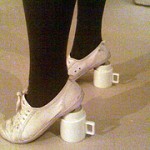 The buzz lately is a recently released study by Marco Narici and colleagues of Manchester Metropolitan University in the United Kingdom. Narici, like many with Y chromosomes, was sitting around contemplating women in their high heels. As an experimental biologist, Marco began to ponder the effect on women’s calf and foot muscles of long periods of time in the unnatural position required of this fashion statement. When the researchers used MRI to examine the legs of high heel wearers compared to flats wearers, there was a significant difference. The muscle fibers in the calf muscles of the high-heeled women were 13% shorter than those of the flats-favorers, and the Achilles’ tendons were stiffer and thicker. These were actual physiological changes that persisted in women who regularly wear high heels. Narici asserts that women don’t need to give up their heels. Regularly stretching the affected body parts allegedly will ease the distortions.
The buzz lately is a recently released study by Marco Narici and colleagues of Manchester Metropolitan University in the United Kingdom. Narici, like many with Y chromosomes, was sitting around contemplating women in their high heels. As an experimental biologist, Marco began to ponder the effect on women’s calf and foot muscles of long periods of time in the unnatural position required of this fashion statement. When the researchers used MRI to examine the legs of high heel wearers compared to flats wearers, there was a significant difference. The muscle fibers in the calf muscles of the high-heeled women were 13% shorter than those of the flats-favorers, and the Achilles’ tendons were stiffer and thicker. These were actual physiological changes that persisted in women who regularly wear high heels. Narici asserts that women don’t need to give up their heels. Regularly stretching the affected body parts allegedly will ease the distortions.
Who says that permanently distorting your body and causing yourself pain for fashion purposes is sexy? Ever since I grew taller than all the boys in seventh grade, I’ve eschewed high heels and prided myself on my cute flats. Let’s call for a national “Flats are Sexy” day. Maybe not crocs or bunny slippers . . .
As for the health news to challenge, the National Breast Cancer Coalition (NBCC) announced in 2008 that breast self-exam (BSE) was not a reliable tool for women to employ in early detection of breast cancer. The data suggest that “BSE greatly increases the number of benign lumps detected, resulting in increased anxiety, physician visits, and unnecessary biopsies.” After the experience of a loved one this week, I say it’s time to revisit this issue. She had a clean mammogram in January, then detected a palpable lump last week. After multiple biopsies, CT and MRI scans, said lump was diagnosed as invasive ductal carcinoma. Talk to your doctor. Learn correct technique. Research, by nature, rolls the experiences of thousands of women together in order to draw conclusions such as that made by the NBCC. I’d rather undergo anxiety and unnecessary biopsies than miss the real thing. Just my opinion.


